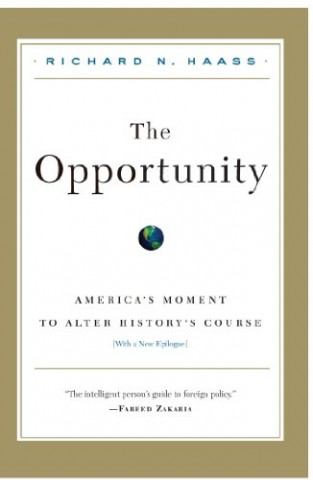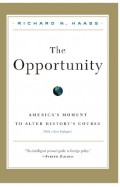- Home
- Non Fiction
- Politics & Current Affairs
- The Opportunity: America's Moment to Alter History's Course
The Opportunity: America's Moment to Alter History's Course
By: Richard N. Haass
-
Rs 1,620.00
- Rs 1,800.00
- 10%
You save Rs 180.00.
Due to constant currency fluctuation, prices are subject to change with or without notice.
We're offering a high
discount on this book as it is slightly damagedIn this dramatic new perspective on international affairs, Richard N. Haass, one of the country's most brilliant analysts and able foreign policy practitioners, argues that it is hard to overstate the significance of there being no major power conflict in the world. America's great military, economic, and political power discourages traditional challenges; no ideological fault line divides the world into warring blocs. India, China, Japan, Russia, and Europe all seek a prolonged period of stability that would support economic growth.
The opportunity thus exists for unprecedented cooperation among the major powers. This is good, because they share vulnerabilities. Globalization, which promotes trade and investment and eases travel and communication, also facilitates the spread of viruses (human and computer alike), weapons, terrorists, greenhouse gases, and drugs. And the United States, for all its strength, cannot defeat these threats alone.
But opportunity is not inevitability. The question is whether the United States will be able to integrate other countries into global efforts against terrorism, the spread of nuclear weapons, genocide, and protectionist policies that jeopardize global economic prosperity. This compelling book explains why it must and how it can.
We're offering a high
discount on this book as it is slightly damagedIn this dramatic new perspective on international affairs, Richard N. Haass, one of the country's most brilliant analysts and able foreign policy practitioners, argues that it is hard to overstate the significance of there being no major power conflict in the world. America's great military, economic, and political power discourages traditional challenges; no ideological fault line divides the world into warring blocs. India, China, Japan, Russia, and Europe all seek a prolonged period of stability that would support economic growth.
The opportunity thus exists for unprecedented cooperation among the major powers. This is good, because they share vulnerabilities. Globalization, which promotes trade and investment and eases travel and communication, also facilitates the spread of viruses (human and computer alike), weapons, terrorists, greenhouse gases, and drugs. And the United States, for all its strength, cannot defeat these threats alone.
But opportunity is not inevitability. The question is whether the United States will be able to integrate other countries into global efforts against terrorism, the spread of nuclear weapons, genocide, and protectionist policies that jeopardize global economic prosperity. This compelling book explains why it must and how it can.
The Opportunity: America's Moment to Alter History's Course
By: Richard N. Haass
Rs 1,620.00 Rs 1,800.00 Ex Tax :Rs 1,620.00
Zubin Mehta: A Musical Journey (An Authorized Biography)
By: VOID - Bakhtiar K. Dadabhoy
Rs 892.50 Rs 1,050.00 Ex Tax :Rs 892.50
The Origins of Political Order From Prehuman Times to the French RevolutioN
By: Francis Fukuyama
Rs 4,045.50 Rs 4,495.00 Ex Tax :Rs 4,045.50
Manning Up: How the Rise of Women Has Turned Men into Boys
By: Kay Hymowitz
Rs 845.75 Rs 995.00 Ex Tax :Rs 845.75
The Obama Syndrome: Surrender At Home War Abroad
By: Tariq Ali
Rs 1,100.75 Rs 1,295.00 Ex Tax :Rs 1,100.75
The Quest For Meaning: Developing A Philosophy Of Pluralism
By: Tariq Ramadan
Rs 1,185.75 Rs 1,395.00 Ex Tax :Rs 1,185.75
No similar books from this author available at the moment.
Zubin Mehta: A Musical Journey (An Authorized Biography)
By: VOID - Bakhtiar K. Dadabhoy
Rs 892.50 Rs 1,050.00 Ex Tax :Rs 892.50
The Opportunity: America's Moment to Alter History's Course
By: Richard N. Haass
Rs 1,620.00 Rs 1,800.00 Ex Tax :Rs 1,620.00














-120x187.jpg?q6)





-120x187.jpg?q6)









